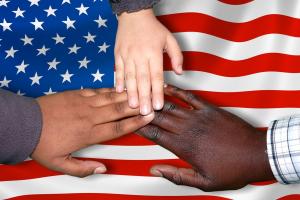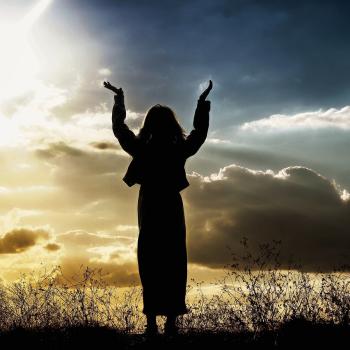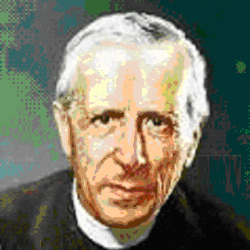Introduction
I have been confused and disturbed by this currently common verbal exchange: “Black lives matter.” No, actually, all lives matter.” Both statements are obviously true and important, yet some strange dichotomy has emerged separating these two truths. A conversation with a friend got me wondering, what’s hiding in these words? “All lives matter” appears to present as a counter argument, when it should be inclusive of black lives matter. Of course, all lives matter. Saying “black lives matter,” doesn’t mean that other lives don’t.
Saying “black lives matter” obviously doesn’t make it instantly so, but it is a peaceful, effective way of raising awareness and a noble, necessary attempt to force us all out of our complacency and wake us up to the lived reality of our brothers and sisters of color. My fear, and what has been troubling me, is that saying “all lives matter” may mean I don’t really want to think about your problems. I have problems of my own and I’m not willing to go the distance to help you with yours. It can be, at worst, a license/justification to do nothing. Further, it’s my way of effectively not listening to you. Does it have to mean, if I am white, that if I focus on “black lives matter,” that I can’t focus on my own needs? Perhaps, deep down I believe that I may have something to lose in such a scenario.
The basic question posed by the ego is always “What about me?” And therein, I have come to think, lies the problem. Are we saying, “Firstly, I need to protect myself and secondly, I am not responsible for what is happening to you?” Have we given in to the fear that there is not enough prosperity, opportunity, shelter, food, and healthcare to go around, a zero-sum world where if someone wins, someone else has to lose? Our fear is rooted in a false sense of scarcity. In almost all spiritual traditions it is taught that the move from service to self to being of service to others is the heart of, the essence of the spiritual journey. A better life for one becomes a better life for all.
A lesson from one family
Rose Nader immigrated with her husband Nathra from Lebanon to the United States in 1925. As is often the case with immigrant families, she instilled in her children their duty to work to improve the country to which they had immigrated, the new home they had grown to love and be grateful for. Her children each became accomplished in their own fields, high achievers all – a physician, an anthropology professor, a consumer advocate. Years ago, I heard a reporter interviewing her, seeking to discover which was her favorite child, which one of her children drew her attention most often, which she felt most akin to, i.e. loved the most? Her very wise answer: The one who is most in need. I have never forgotten her answer.
Around dinner tables in the evening all across America families gather in one form or another. They talk about their days, their lives, their hopes, their dreams and their disappointments. They share who they are as they grow and change and struggle with the ways in which, they believe, life has treated them fairly or unfairly. Those of us who are parents, older relatives and caregivers quickly become acutely aware of the ups and downs in the lives of the children in our care. And, we quickly notice, that as soon as things appear to resolve for one child, another has risen to the family’s attention. Rose Nader couldn’t have been more right. All of these things are held with love and compassion within the family and by the family. It is likely the same in most every family though the meeting times and meals differ, and with every parent, and with our ultimate parent mother/father God, as she/he experiences incarnation through each of us.
The Family of Man
I was fascinated as a young girl by National Geographic – the exotic images of different cultures, ways of dress, unusual adornments, musical instruments, languages, and beliefs about the supernatural. We are one family, we humans. Our universe expands at the hand of one ever-changing, creative, evolving life force.
In books and films, we celebrate diversity of all life forms, birds, animals, fish, insects, etc. but not, so much, of our fellow humans. And, while we celebrate the wonder and diversity of all life, we do not necessarily provide for and support it. We destroy habitats, hunt for sport, destroy heritage seeds, and ignore the climate change enveloping us all. When will we as a species step into the “shoes” and “roots” of the animals and plants and speak out for them, as they cannot speak for themselves?
Head versus heart
Our urge to say “all lives matter” comes from our heads/our ego, not from our hearts. Our heads are good for taking things apart, for highlighting their differences, their weaknesses and strengths, for evaluating their importance and usefulness. The “all lives matter” response arises here. But, the head can also give rise to false fears, for example, the zero sum notion of scarcity. Our hearts are best at pulling things together, seeking our commonalities, our shared hopes and dreams, envisioning our future together. When these capacities are brought into service where they are most appropriate, we act with compassion.
Americans have long been known throughout the world for their kindness and generosity of heart, shown by generation upon generation of Americans in times of global need. We do know how to get this right when we come out of our fear of the other, out of our heads, out of our egos and its needs. One need only witness our compassionate reactions during disasters, hurricanes and floods, the giving spirit which we associate with being Americans. Americans have big, generous hearts.
We’re not there yet, but we’re headed in the right direction
We are part of an awesome celebration of life. The multiple age groups, racial diversity and sheer numbers of people taking to heart the needs of our brothers and sisters of color are truly heartening. It is long overdue that our brothers and sisters be attended to at the “dinner table,” that they be afforded the dignity and respect we are all guaranteed as children of God. This is a critical step in the continuing evolution toward oneness of the family of man, and, ultimately, the family of all life. We all want and deserve the same things for ourselves and our children – a home, physical safety, good health, a sense of autonomy and an unfettered opportunity coupled with hard work to thrive. We all need to feel that we have the right and the opportunity to direct our lives, chart our own destinies, not that life just happens to us as a result of other people’s decision making.
As Americans, we put so much stock in our collective sense of dignity, yet this image of ourselves remains counterfeit, an illusion, unless and until we are all afforded the same dignity. Honestly, if all lives mattered, we wouldn’t have to say it. We would already be living it.

















